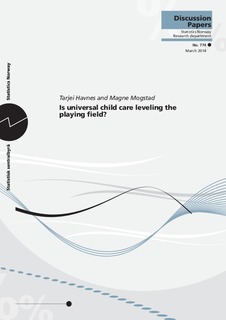Is universal child care leveling the playing field?
Working paper
Published version
Permanent lenke
http://hdl.handle.net/11250/2627818Utgivelsesdato
2014-03Metadata
Vis full innførselSamlinger
- Discussion Papers [1003]
Sammendrag
We assess the case for universal child care programs in the context of a Norwegian reform which led to a large-scale expansion of subsidized child care. We use non-linear difference-in-differences methods to estimate the quantile treatment effects of the reform. We find that the effects of the child care expansion were positive in the lower and middle part of the earnings distribution of exposed children as adults, and negative in the uppermost part. We complement this analysis with local linear regressions of the child care effects by family income. We find that most of the gains in earnings associated with the universal child care program relate to children of low income parents, whereas upper-class children actually experience a loss in earnings. In line with the differential effects by family income, we estimate that the universal child care program substantially increased intergenerational income mobility. To interpret the estimated heterogeneity in child care effects, we examine the mediating role of educational attainment and cognitive test scores, and show that our estimates are consistent with a simple model where parents make a tradeoff between current family consumption and investment in children. Taken together, our findings could have important implications for the policy debate over universal child care programs, suggesting that the benefits of providing subsidized child care to middle and upper-class children are unlikely to exceed the costs. Our study also points to the importance of universal child care programs in explaining differences in earnings inequality and income mobility across countries and over time.
